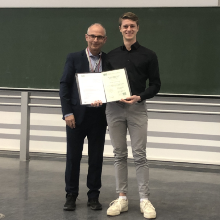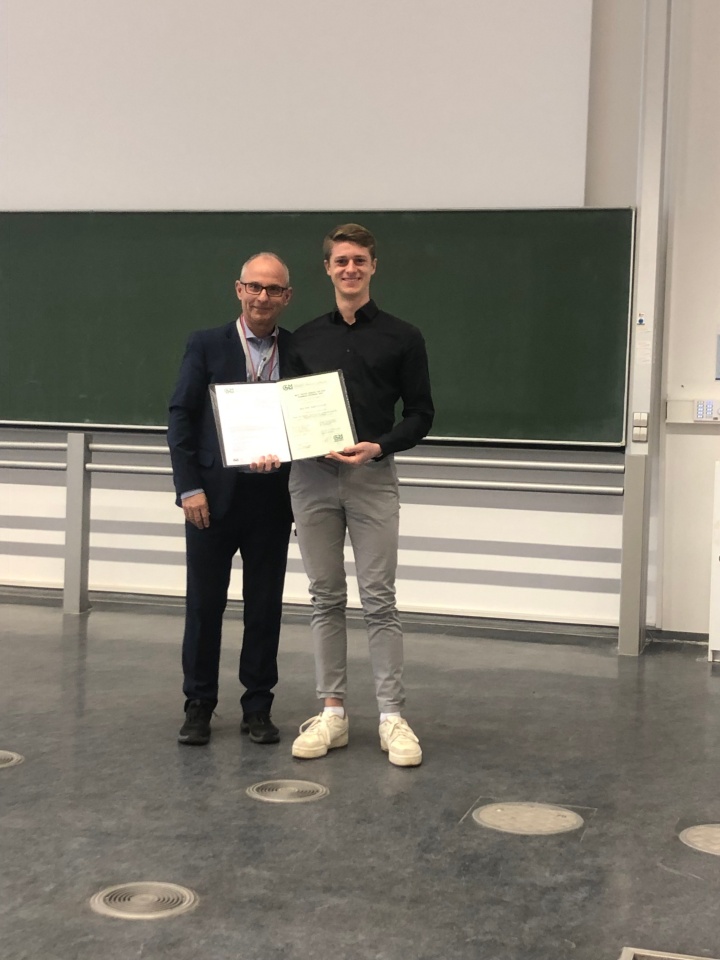Since 2021, the GAMM Juniors award the annual “GAMMAS Best Paper Award” honoring the best GAMMAS publication. It’s the second year in a row, that a SimTech early career researcher is receiving the award.
Niklas Hornischer receives Best Paper Award 2023
On the occasion of the 94th Annual Meeting of the International Association of Applied Mathematics and Mechanics (GAMM Annual Meeting) which is currently taking place at the Otto von Guericke University Magdeburg, Niklas Hornischer received the GAMMAS Best Paper Award 2023 which was presented by GAMM President Prof. Karsten Urban, University of Ulm. The Simulation Technology student, is awarded for his publication on “Model Order Reduction with Dynamically Transformed Modes for Electrophysiological Simulations”.
Abstract: The numerical simulation of neuromuscular processes in skeletal muscles typically imposes high computational costs, resulting in the need for techniques to reduce these costs. One submodel in these types of multiphysics multiscale simulations is the electrophysiological model, describing the propagation of an action potential (AP) in a muscle fiber. Involved in the simulation of the propagation are two traveling waves, resulting in difficulties for classical model order reduction (MOR) techniques based on linear subspaces. Instead, we apply the nonlinear MOR method shifted Proper Orthogonal Decomposition (sPOD) to construct dynamically transformed reduced basis functions depending on time-dependent paths spanning the adaptive reduced ansatz space. Our numerical experiments demonstrate that the constructed reduced ansatz space can accurately capture the dynamics of two fully separated wavefronts and reduce the degrees of freedom of the whole simulation. However, it cannot represent the activation of the AP in the center of the fiber and overlapping wave parts. The constructed reduced order model outperforms the high-dimensional full order model in terms of the computational costs while the accuracy is maintained and reaches speedup factors between 2 and 73 depending on the time discretization.
The publication goes back to Niklas Hornischer’s bachelor thesis which was written in 2022 at the Institute of Applied Analysis and Numerical Simulation (IANS) under the supervision of Dominik Göddeke (SimTech PI), Benjamin Unger (SimTech Junior Research Group Leader) and Felix Huber (former SimTech student and now SimTech doctoral researcher). In September 2023 the results were published in GAMMAS - the GAMM Archive for Students.
Abdullah Mujahid receives Best Paper Award 2022
Already in 2023, Abdullah Mujahid was awarded the GAMMAS Best Paper Award 2022 for his work on “Monolithic, non-iterative and iterative time-discretizations for linear coupled elliptic-parabolic systems” that was supervised by Robert Altmann (former Augsburg University; now OVGU Magdeburg) and SimTech Junior Research Group Leader Benjamin Unger.
Abstract: We compare four numerical methods for the time discretization of linear coupled elliptic-parabolic systems. The monolithic method arising from an implicit Euler discretization is the primary method for solving the coupled system. Accelerated solution via non-iterative decoupling is possible by the semi-explicit Euler discretization, using a novel methodology from related delay differential equations. For poroelasticity, the fixed-stress splitting and undrained splitting methods enable iterative decoupled solves. We present formulations for the iterative methods in an abstract form and compare through numerical experiments the a priori convergence results for the four methods.
Abdullah Mujahid is a doctoral researcher in the Junior Research Group on Dynamical Systems of Benjamin Unger and works on the DFG project “Decoupling integration schemes of higher order for poroelastic networks” that Benjamin Unger acquired together with Robert Altmann in 2021. Abdullah Mujahid is thereby working on the development and analysis of numerical methods for the time integration of poroelastic equations. This involves a coupled system of partial differential equations consisting of both elliptic and parabolic equations. The special feature of the time integration methods developed by Abdullah is that they decouple the equations so that specialized solvers can be used for the individual equations. The equations are used both in the SFB 1313 and in various SimTech projects.
GAMMAS is an open access peer-reviewed journal that is completely run by the GAMM Juniors and has a wide scope across applied mathematics and mechanics, and is particularly addressing very early-stage researchers to publish results, educational case studies and student projects.



